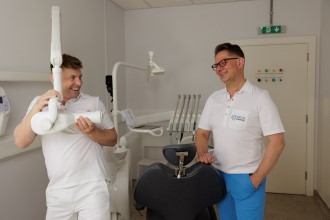
Periodontology is the study of the specialised system of hard and soft tissues that supports your teeth and maintains their position in the jaw.
This apparatus, known as the periodontium, has some very important functions: it securely attaches the teeth to the jaws; it acts as a shock absorber during biting and chewing and therefore helps to prevent damage to the teeth from excessive forces; and it maintains the teeth in a stable position within the jaws so that that they work together efficiently and comfortably during chewing.
Why is periodontology important?
In many ways, the mouth can be seen as a mirror of the general condition of your body. In particular, our periodontal status can often tell us more than simply what is happening locally in our gums. Although periodontitis is always triggered by plaque accumulation on the teeth, diseases affecting the rest of the body, known as systemic diseases, can weaken the supporting structures of the teeth.
Also, some serious disorders are known to show themselves in the mouth before they are evident in any other part of the body. Therefore, it is sometimes the case that a trained periodontist is the first person to detect the signs of a general disease, such as diabetes or blood disorders, when examining a patient’s mouth. Because of this association with general health and overlap with other medical disciplines, periodontology can rightly be regarded as a ‘holistic’ form of dentistry.
European Federation of Periodontology (click here to see the website)
